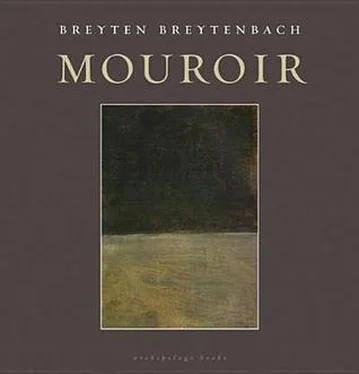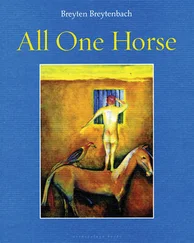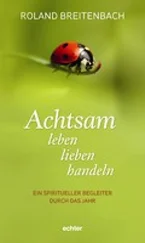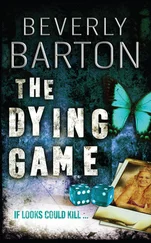Deeper inside the city we decided to fortify the inner man in a restaurant (situated in a tower) noted for its delicate dishes, the clusters of crystal grapes in small bowls of ice water, the steamed napkins impregnated with the odour of myrrh, its stock of Nuits-Saint- Georges Grand Cru. This tower, encircled by a rank growth of shadow trees and gardens beautiful as if trimmed with velvet set out on several levels, this tower then was on a rather steep slope so that the diner with the spoon in the right hand (a feeling of silver under the fingertips) could look through the window over the bay with its babbling little waves, could sink away in his own ruminations, a thread of angel’s hair stuck to his lower lip. Now the environment has been rendered desolate and the brown varnish of the tower has started peeling away in strips and curls, the rooftiles have become lustreless. Perhaps a dead pigeon in a gutter somewhere. (Watch out!) There was the unseasonly pollen of dust in the trees. And the tower’s doors were barred. We still knocked against the wooden panel. Knock knock knock. After some minutes the latch was lifted and the door pulled open from the inside by an elderly man dressed in the somewhat slovenly clothes of a head waiter, maybe even a maître d’hôtel, and with a dark blue apron reaching to just above the shoe-caps. On the forehead, hard above the bridge of his nose, he had a rose-coloured birthmark like a blossom pressed between the pages of a complete encyclopaedia. Next to his left eye was a mole. He let us in and invited us to sit at a large table in one of the rooms off to the side. In the distance a canonnshot puffs. Like a heavy bell broken loose from its beams and ropes would plunge down the campanile. We are the only guests in the eating place, it would seem. The panes are full of bee tracks. Below us a schooner walked in a stately fashion over the water to the security of a cove or a bay — who will know? — with the evening sun’s book of flames in the sails a crimson contrast with the green shiver of the sea. It is a delegation of burning trees — the light a thin layer of snow or silver fur over the yards and the rigging and a shiny dampness in the water as also from the pendulum of the bow — all of this in an inexplicable way continuing to burn in the water — it is a delegation bringing the light of civilization to a dark region. The old man with the birth-flower came to lay the table with utensils of the finest silver. We are served several kinds of salad. (That which I missed so badly in prison.) Water pellets like fishscales glistening in the fleshiness of the leaves, and the walls of the room were tinted red by the silent flame-tower far below us on the sea. Only the crepitation of dry twigs being broken somewhere in the hills. The old man has one very slow foot. A flapping sole maybe? There’s no icecream on the menu: always a bad omen. I think the glasses were crystal.
High up, against the neck of the hummock where the twisting ground track ends and runs to earth, K waited for me. We pulled up our pants a little higher, considered the possibility of sticking the trouser legs in the tops of our socks. Then we climbed further up the incline to a part of the hill with denser vegetation, away from the growl of the city, and we were glad to be out of the sun’s shuddering under the coolth of trees. Partly in shadow and partly in the sun an ancient milk cart stood as if it would never get going again, an emaciated nag slumping listlessly between the draught poles, the hide too thin and the bone structure etched, a pitiful old bag; also the driver with frayed waistcoat, ostensibly out of heart, he had a tin with tobacco in his trouser pocket and a knuckly hand on the lump formed by the tin in the pocket on the thin leg. A ridge-backed rock lizard lies breathing in the heat. Round the mouth line of the driver there is the blue of inkstains and a mobile hairiness, a fudged drawing, a nib stuttered stuck in the blotting paper. Sharply defined lie the shadows on the earth under the horse and the cart, under those parts which catch the sun, haunch and splashboard and nodules and belly and spokes and tail; the shadow Indian blue and lame and ungainly with clusters of meatflies, innards which burst open are splashed over the soil, anchoring the vehicle and its passenger now. At first there were only cypresses with dark ink blotches around the trunks but gradually the roof of leaves above our heads became denser and in places the narrow alleys were overgrown with ferns, thistles, sorrel. At once we are in a part of the forest where the ground is most uneven, strewn with rough boulders. First we notice nothing else, nothing remarkable, nothing out of the ordinary. Then, as with those games in the newspaper where you have to look closely at the drawing to suddenly descry all kinds of figures camouflaged in the thickets, then there are all around us among the trees and the shrubs or half hidden by rocks a great number of very old horses. Some are already paralysed and can barely move the heads ever so slowly, heads with skin stretched drumtight over the bones so that you may read the outline of the skulls quite clearly, an archaic alphabet. Others try again and again to stumble to their legs. Many have a red mucid moustachiness about the lips; a thin film of foam. It is as if they are transparent, of an ancient type of glass, pale rose and pale violet are the dominant colours, but inside the yawn-thin carcasses there is nearly nothing to see except, now and then, the absent-minded peristalsis of entrails. Some still attempt to eat of the grass and the leaves. When they try to move it is a most painful and clumsy struggle. It hurts you to watch. The eyes are opaque and white and infirm like things suffering even in the subdued green sheen of the forest; around the rims in the corners of the eyes, there is a white crust, an excretion, and minuscule white scrawlers gnawing at the very eyeballs. Maggots? Where the sun penetrates and floats down like a leaf, a pale flash, an eye is sometimes a mirror throwing back a dumb whiteness. Above and below the eyes the hollows of the sunken sockets are bruised and dark, as broad and as deep as the hand of a man. We were in the secret place where decrepit horses come to pass away but cannot; they can’t ever die because here everything is in a state of waiting. There were practically no sounds; occasionally the snap of a branch when one horse trying to get up flounders against another tired animal. Above, through the treetops, there was also at times the softly gnashing flight of a sea breeze. Those among the beasts which were already lying down tried stretching the heads, heavier than undeciphered hieroglyphs, as far as possible away from the bodies in order to catch some air, and then there was a thin trickle of ants, a crumbling black snottiness, from some hole in the ground to the nostrils. The broken attempts at breathing moved the grass blades. Over all of this there was the sweet clove-like smell of dying, the old odour of hairless horsehides, perhaps too the swooning scent of live decomposition. But not of death. Graviora quaedam sunt remedia periculis .
(After he tried for six years to attain enlightenment by living the life of an ascetic and by subjecting his body to all sorts of deprivations, the Buddha says — as written down in the Majjhima Nikā̄ya , Sutta 36, that is in The Sayings of Medium Length:
Because I ate so little my limbs became like the joints of dried-up creepers. . my buttocks were the hooves of a bull: my protruding spine like a string of balls. . my ribcage the crazy rafters of a tumbled-down barn. . the pupils of my eyes looked as if they were lying low and deep. . my very scalp was wrinkled and shrunken as a white calabash cut off before it could ripen is shrunken and wrinkled by a warm wind. When I think: “I shall touch the skin of my stomach” then it was my spine I took hold of. The skin of my stomach clung to my back. When I think: “I shall obey my natural needs”, then I fell over on my face just there. . When I. . stroked my limbs with my hand, the hairs, rotten at the roots, came away from my body.)
Читать дальше












